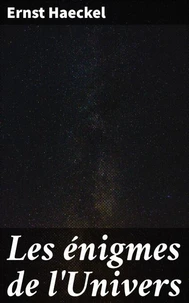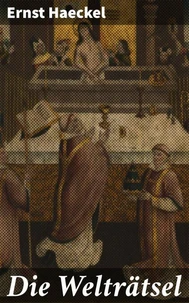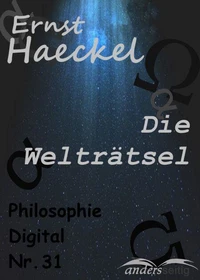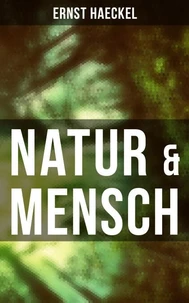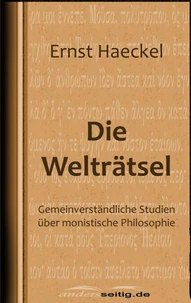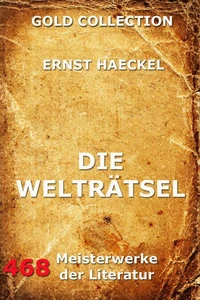Freedom in Science and Teaching. from the German of Ernst Haeckel. Advancing Knowledge Through Unrestricted Inquiry and Education
Par :Formats :
Disponible dans votre compte client Decitre ou Furet du Nord dès validation de votre commande. Le format ePub est :
- Compatible avec une lecture sur My Vivlio (smartphone, tablette, ordinateur)
- Compatible avec une lecture sur liseuses Vivlio
- Pour les liseuses autres que Vivlio, vous devez utiliser le logiciel Adobe Digital Edition. Non compatible avec la lecture sur les liseuses Kindle, Remarkable et Sony
 , qui est-ce ?
, qui est-ce ?Notre partenaire de plateforme de lecture numérique où vous retrouverez l'ensemble de vos ebooks gratuitement
Pour en savoir plus sur nos ebooks, consultez notre aide en ligne ici
- Nombre de pages160
- FormatePub
- ISBN4057664597816
- EAN4057664597816
- Date de parution02/12/2019
- Protection num.Digital Watermarking
- Taille529 Ko
- Infos supplémentairesepub
- ÉditeurGOOD PRESS
Résumé
In "Freedom in Science and Teaching, " Ernst Haeckel articulates a fervent defense of scientific inquiry and education free from dogmatic constraints. Drawing on the intellectual currents of the late 19th century, Haeckel employs a passionate and engaging literary style to champion the importance of empirical research and evolutionary theory, countering the rigid doctrines of his time. The work serves not only as a manifesto for intellectual freedom but also as a critical examination of the relationship between science and religion, resonating with the burgeoning spirit of secular humanism and scientific rationalism that characterized his era.
Ernst Haeckel, a prominent biologist and philosopher, was instrumental in popularizing Darwinism in Germany. His wide-ranging interests in art, philosophy, and natural sciences profoundly shaped his belief in the interconnectedness of all life. Haeckel's experiences in academia and his encounters with ecclesiastical resistance to scientific progress undoubtedly influenced his resolve to advocate for freedom in both scientific thought and pedagogical practices, illustrating his commitment to a secular understanding of the natural world.
This seminal work is an essential read for those interested in the evolution of scientific thought and the ongoing dialogue between science and religion. Haeckel'Äôs call for intellectual autonomy remains relevant today, making this book not only a historical document but a source of inspiration for modern educators and scientists fighting for the integrity of scientific discourse.
Ernst Haeckel, a prominent biologist and philosopher, was instrumental in popularizing Darwinism in Germany. His wide-ranging interests in art, philosophy, and natural sciences profoundly shaped his belief in the interconnectedness of all life. Haeckel's experiences in academia and his encounters with ecclesiastical resistance to scientific progress undoubtedly influenced his resolve to advocate for freedom in both scientific thought and pedagogical practices, illustrating his commitment to a secular understanding of the natural world.
This seminal work is an essential read for those interested in the evolution of scientific thought and the ongoing dialogue between science and religion. Haeckel'Äôs call for intellectual autonomy remains relevant today, making this book not only a historical document but a source of inspiration for modern educators and scientists fighting for the integrity of scientific discourse.
In "Freedom in Science and Teaching, " Ernst Haeckel articulates a fervent defense of scientific inquiry and education free from dogmatic constraints. Drawing on the intellectual currents of the late 19th century, Haeckel employs a passionate and engaging literary style to champion the importance of empirical research and evolutionary theory, countering the rigid doctrines of his time. The work serves not only as a manifesto for intellectual freedom but also as a critical examination of the relationship between science and religion, resonating with the burgeoning spirit of secular humanism and scientific rationalism that characterized his era.
Ernst Haeckel, a prominent biologist and philosopher, was instrumental in popularizing Darwinism in Germany. His wide-ranging interests in art, philosophy, and natural sciences profoundly shaped his belief in the interconnectedness of all life. Haeckel's experiences in academia and his encounters with ecclesiastical resistance to scientific progress undoubtedly influenced his resolve to advocate for freedom in both scientific thought and pedagogical practices, illustrating his commitment to a secular understanding of the natural world.
This seminal work is an essential read for those interested in the evolution of scientific thought and the ongoing dialogue between science and religion. Haeckel'Äôs call for intellectual autonomy remains relevant today, making this book not only a historical document but a source of inspiration for modern educators and scientists fighting for the integrity of scientific discourse.
Ernst Haeckel, a prominent biologist and philosopher, was instrumental in popularizing Darwinism in Germany. His wide-ranging interests in art, philosophy, and natural sciences profoundly shaped his belief in the interconnectedness of all life. Haeckel's experiences in academia and his encounters with ecclesiastical resistance to scientific progress undoubtedly influenced his resolve to advocate for freedom in both scientific thought and pedagogical practices, illustrating his commitment to a secular understanding of the natural world.
This seminal work is an essential read for those interested in the evolution of scientific thought and the ongoing dialogue between science and religion. Haeckel'Äôs call for intellectual autonomy remains relevant today, making this book not only a historical document but a source of inspiration for modern educators and scientists fighting for the integrity of scientific discourse.




